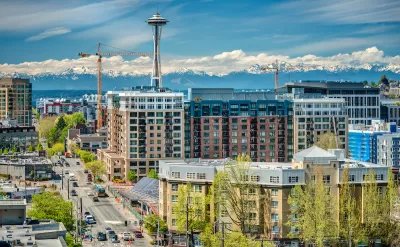An update to the city’s comprehensive plan will reduce, but not fully eliminate, parking mandates for housing developments.

Seattle intends to maintain minimum parking requirements in much of the city, even as it has reduced other restrictions on new housing construction, reports Ryan Packer in The Urbanist.
“The fact that the City of Seattle intends to keep parking mandates that could impede housing growth was a footnote as the City released new zoning maps last month, as part of the latest update to Bruce Harrell’s One Seattle Comprehensive Plan.” Yet the city has led the way on parking reform in the past, eliminating parking mandates near transit in 2012.
The updated rules would lower requirements to one stall per every two housing units. “This would apply to the city’s new middle housing regulations, which are set to allow four to six units on all lots across the city, but also to the 30 new “neighborhood centers” proposed, which include places like Tangletown, North Magnolia, and central Beacon Hill, where more units would be allowed.”
According to Matt Hutchins, founding principal at CAST Architecture, “The difference between having zero parking spaces and having one parking space might be that there’s 1,000 square feet of extra paved area.” Hutchins told The Urbanist, “It has an outsized effect. And many, many places have demonstrated that that [sic] not requiring parking doesn’t mean that developers won’t provide it when they can or want to.”
FULL STORY: Seattle Set to Double Down on Arbitrary Parking Mandates

Planetizen Federal Action Tracker
A weekly monitor of how Trump’s orders and actions are impacting planners and planning in America.

Chicago’s Ghost Rails
Just beneath the surface of the modern city lie the remnants of its expansive early 20th-century streetcar system.

San Antonio and Austin are Fusing Into one Massive Megaregion
The region spanning the two central Texas cities is growing fast, posing challenges for local infrastructure and water supplies.

Since Zion's Shuttles Went Electric “The Smog is Gone”
Visitors to Zion National Park can enjoy the canyon via the nation’s first fully electric park shuttle system.

Trump Distributing DOT Safety Funds at 1/10 Rate of Biden
Funds for Safe Streets and other transportation safety and equity programs are being held up by administrative reviews and conflicts with the Trump administration’s priorities.

German Cities Subsidize Taxis for Women Amid Wave of Violence
Free or low-cost taxi rides can help women navigate cities more safely, but critics say the programs don't address the root causes of violence against women.
Urban Design for Planners 1: Software Tools
This six-course series explores essential urban design concepts using open source software and equips planners with the tools they need to participate fully in the urban design process.
Planning for Universal Design
Learn the tools for implementing Universal Design in planning regulations.
planning NEXT
Appalachian Highlands Housing Partners
Mpact (founded as Rail~Volution)
City of Camden Redevelopment Agency
City of Astoria
City of Portland
City of Laramie





























